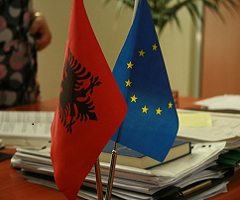This is not an original article of invest-in-albania.org.
This article is written by Idlir Gjata, published for the first time at Ekon.al and translated from Albanian to English by invest-in-albania.org. You may read the original one by clicking here.
The candidate status is only a political signal, an encouraging letter for the next steps in the long way of Albania toward the integration to the European Union, because doesn’t provide any extra fund for country’s economy (according to the declaration of Netherland’s Prime Minister, IPA funds will remain in the same amount) but despite that, the public opinion has a high sensitivity for this event. Following thisline of thought, the winning of the candidate status, relates to our aspirations for the fully integration in the most developed countries organization of the region where we belong to, but few of us ask about the huge difference between our standarts and those of Eurozone member countries and what this process really means in each aspect.
From the economic point of view, European Union is established upon the concept of freedom to choose. This freedom may exercise when there are many actors in the market, considering the demand and the offer as well. In this case, individuals exercise their fundamental freedom to agree after a negotiation. The natural price of a product is a result of these negotiations, which shares transaction profits in a decent way between all parties. With the reduction of the number of sellers, it is expected that their negotiating force will heighten and as a consequence of that, the equilibrium price will increase to the detriment of consumers and the general economic level. In cases when the concentration of the market becomes problematic and hampers the competition, it is necessary the involvement of competent authorities. The case of the 563 ml euros bribe proposed by European Commission for competition toward Microsoft, after the company didn’t offer its users the possibility to choose their preferred browser and the obstruction of General Electrics to buy Honeywell, are typical study cases of business and law schools.
In Albania, the Competition Authority plays the role of the market supervisory, which fights the anti-competitive practices that appear in the market as prohibited agreements and cartels; prohibits the abusing practices so that new companies that enter in the market can have the possibility to compete with the existing enterprises; encourage the merger of enterprises that transform into more competitive companies as well as disallow companies that may threaten the fair competition; evaluate legal and sub legal acts in order to prevent the restriction or the distortion of competition or companies who support other inefficient companies.
The mobile phone market seems problematic since it is displayed as a anti-competitive phenomenon because of the huge difference of tariffs of callings inside the network and those outside the network by consolidated operators in the market, even why the costs are approximate. This phenomenon which has conditioned the consumator’s behavior and has caused negative impact for the free competition, has prompted that the number of callings inside the network to be in the highest level in the world (97% of callings inside the network, Kenia is the second with 96% of them) and in the concentration of the market, where a sole company has circa 50% of the market and two other companies (the biggest in Albanian telecommunication market) have almost 90% of it.
Another problematic market is the insurance market. The swift fall of prices after the liberalization in very low and in non-competitive levels, a situation confirmed by different actors of the market and also by competent supervisory authorities and it is not yes solved by diversifying the product according to the proposed model, but it is achieved by coordinating the increase of price.
The problematics of these two markets, that of energy and fluid gas and also the problematics that appear in other markets, which show the weakness of competition in Albania, must be the main focus of all responsible authorities.
The competition authority is a supervisory of competitiveness but it cannot do anything, only if there will be a collaboration and a good will by all other actors of the market.
As seen in this analysis and other national or international studies, the Albanian market is not completely free and not in the same standarts as those of European Union member states.

Leave a Reply
You must be logged in to post a comment.